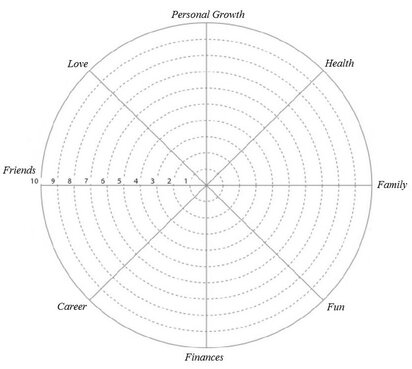|
κατά τη διάρκεια του COVID-19
Είναι το COVID-19 μια φοβερή καταστροφή ή μια άνευ προηγουμένου ευκαιρία; Μπορεί να είναι και τα δύο. το αποτέλεσμα είναι εν μέρει η επιλογή σας. Ασκήσεις κατά τη διάρκεια του Webinar:
Δείτε ολόκληρο το κείμενο με τις προτεινόμενες επιλογές εδώ. Is COVID-19 a terrible disaster or an unprecedented opportunity? It can be both; the outcome is partially your choice. Dream, Immerse, Grow (D.I.G. ) “If it’s to be it’s up to me,” they say. Due to the quarantine measures, you have an unprecedented opportunity to Dream, Immerse & Grow; to re-examine your values and your life and to plan and prepare for your future. You also have the chance to spend time and connect with loved ones - or you can choose to spend this time watching the news and complaining about the situation. It’s up to you! Here are three recommendations, for those who wish to adopt the second perspective.
1. AWARENESS The X/3 Formula Today, a 50 year old in a developed country expects to live another 30 years. The truth is we spend 8 hours at work and 8 hours per day asleep. That leaves 8 hours for personal activities. Using the X/3 Formula you can calculate how many years of life you have left. According to the formula, your Remaining time on this planet = [Life expectancy] - [Your age] / 3. Here is a working example for the 50 year old: [80] - [50] / 3 = 10 years! (I know, the 50 yr old will retire, which will allow a little more personal time). What will you do to ensure you make the most of your personal time left? What will you not do anymore? What does your “wheel of life” look like? This exercise will allow you to assess the different areas in your life. Use a grade from 0 (low) to 10 (high) to assess each area, and place a mark on each radius. When you are done, connect the dots. Does your wheel look round and inflated? What areas would you like to improve? 2. GOALS Connect with your values Where do you want to be in a few years? What would you like to do, be, or have? What do you enjoy spending time on? What will make you healthier, happier and more prosperous? What are your priorities? How are you doing with your No1?Consider the following. If you could only work on one skill, which one would yield the most benefits? Which one of your “shares” would produce the most value, if you decided to invest on it? With that in mind, what is your No1 priority at work (or in life)? Why? What, then, should be your No1 activity? OK, so how are you doing with your No1? Does your daily activity correspond to your priorities? If not, why? Plan What do you need to do? What do you need to learn? Who can help you? Who or what can stop you? What will you do? When? How? This online behaviour change contract will help you commit to what you will decide to change and describe how. Tailor it to your needs, choose your rewards/punishments, decide on your plan, set a deadline, and receive your contract on your email. Then follow it! 3. OPTIONS FOR USING YOUR TIME If you chose to D.I.G., here is a (brief) list of some options for you. Professional development Learn new skills, build or refresh your CV and LinkedIn profile, apply for new jobs, create your website (using wordpress, wix, weebly, etc.). Personal development Learn how to search or power search on Google, develop some of the top 10 most wanted skills (problem solving, critical thinking, communication, etc.), get an online degree, attend a MOOC (e.g., Learning how to teach online, Happiness) or complete micro courses, watch TED Talks, listen to podcasts while doing other things, become an expert user of different software from Accounting to Yoga Studio Management. Relax Meditate, listen to music from thousands of internet radio stations or Spotify, improve your dancing skills, or attend YouTube classes on virtually anything. Exercise Download nutrition and fitness apps or get fit working out with online instructors (without any equipment), lose those extra kilos. General
Learn how to work smarter (e.g., dictate to your phone/computer instead of typing), cook, read, work on your stress or anger management, assertiveness, communication skills, get organized, clean up, etc. Social Connect with family, relatives and friends using one of many teleconference options (Skype, Zoom, Google hangouts, Facebook), help others. With the kiddies Spend time playing with your children, go through the 24 killer websites that make you cleverer and pick your weapons together, etc. CONCLUSION There is plenty of time for self-pity and misery or time to D.I.G. (Dream, Immerse, Grow) and to connect with loved ones. What will you choose? Well done, I thought so! RELATED RESOURCES Books Atomic Habits: An Easy & Proven Way to Build Good Habits & Break Bad Ones Idiots are invincible: The fool-proof “Ro” method for solving problems, dealing with challenges - and enjoying the process! The 7 Habits of Highly Effective People Articles listing productive things to do 161 Productive Things To Do When Quarantined 100 useful things you can do to kill boredom 100 things to do while stuck inside How to Stay Physically and Mentally Healthy While COVID-19 Has You Stuck at Home Calendars with one idea per day The Greater Good Happiness calendar (integrates with your calendar) The 365-Day Happiness Challenge Guaranteed to Change Your Life ©Angelos Rodafinos, Author Idiots are Invincible and Prince to Frog and vice versa Cartoons: K. Papantoniou  Given the current situation with COVID-19, more and more meetings will be run online. Eventually people will realise that online meetings do not differ much to face-to-face ones. Here are a few quick tips for participants and organizers. When: Only run meetings when needed. Start on time and keep them short, sweet and to the point (e.g., free Zoom sessions are 40 mins max). If longer, take a break every 40-45'. Why: To discuss matters that need approval / decision making AND cannot be resolved offline. Where: Make it easy for all. Pick a suitable software that allows laptop/mobile/tablet/dial in options, Who: Invite only those needed. Engage participants by pre-assigning tasks and/or asking them to contribute. What: Use an agenda with topics and expected duration for each - and stick to it. Assign a timekeeper if needed. How: Format: intro to the issue, recommendation, decision. If further research is needed, assign a member/team to work on it and come up with a suggestion next time (rather than starting a long discussion during the meeting). Record the outcomes and agreed actions. Come prepared: Check the agenda and related material. Be ready to update the team with what you have been working on. Etiquette: Show up on time or 10' earlier if you wish to chat.. Be polite. No checking of mobiles, emails. Respect others. Attack the problem, not the person. Use headphones and switch your mic off when not speaking (to avoid noise & echo). rodafinos.weeble.com |
Dr Ro's blogShare your ideas for problem solving and dealing with idiots, or join the Idiots Club (a.k.a. Boneheads' Academy) in Facebook. Archives
July 2024
Categories |



 RSS Feed
RSS Feed

